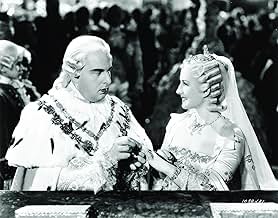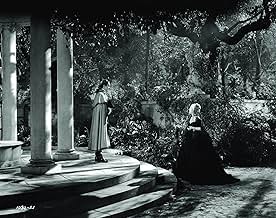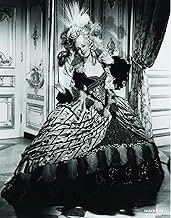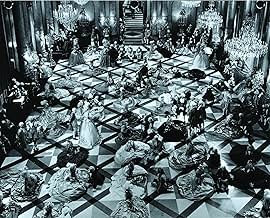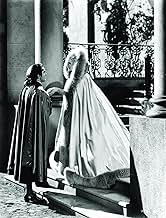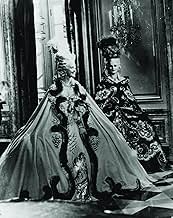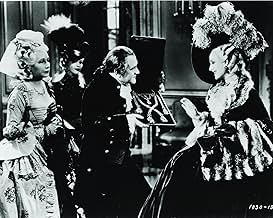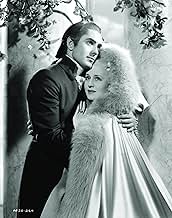IMDb रेटिंग
7.3/10
3.4 हज़ार
आपकी रेटिंग
अपनी भाषा में प्लॉट जोड़ेंThe tragic life of Marie Antoinette, who became queen of France in her late teens.The tragic life of Marie Antoinette, who became queen of France in her late teens.The tragic life of Marie Antoinette, who became queen of France in her late teens.
- 4 ऑस्कर के लिए नामांकित
- 5 जीत और कुल 5 नामांकन
Albert Dekker
- Comte de Provence
- (as Albert Van Dekker)
फ़ीचर्ड समीक्षाएं
A legend in France tells that Julien Duvivier was involved in this film;if he really did something,it was probably minimal;an educated man like him would have been scared by the numerous historical errors of the film.
Here are some of them: -Never Louis XV spoke of sending the dauphine back to where she once belonged,in Austria.The quarrel with Madame du Barry is pure fiction:M.A. spoke once to the favorite ,she said " There are many people here today in Versailles."She never addressed her afterward.
-Louis XVI was not the moron we see in the film.He was actually an educated man.When he was in jail,he would teach his son maths,history ,geography and other subjects.He was not made to be king,that's true ,and all that follows Louis XV 's death is accurate .He reportedly said to his distraught wife :"What a misfortune,we're too young to reign!".He used to go hunting (his favorite pastime) but he was not the half-wit depicted in Van Dyke's film.
-The Royal family was not imprisoned in Le Temple just after the night of Varennes.That escape took place on the 20th of June 1791.The storming of the Tuileries (not included in the movie for a good reason)happened on August ,the 10th 1792;the fall of the monarchy and the Republic followed in September the same year.
-But the queen's last night takes the biscuit!Fersen in her dungeon,no less!
Forget history,and you have a wonderful show,a novel based on M.A.'s life.There are many remarkable things all along the viewing: M.A. in the corridors of her palace,in Vienna ,where her mother tells her "You shall be queen of France" . The sentence will come back ,quite rightly so,in the last pictures.
The affair of the necklace,told in admirable succinct style;the scene when the queen learns that the cardinal de Rohan is free ,while arriving at the opera theater,is a great dramatic idea.
The longest night of June,which tragically ended in Varenne is given an adequate dark treatment where only the torches lighten the forest or the village.
The scene which climaxes the movie is the Royal family's last supper.Here Robert Morley transcends the limitation he is working under ,and makes Louis XVI a clever sensitive man :the rapport he has with his child was obvious in real life and all rings true.The broken soldier's story will intensely move you.Besides ,it was a good idea to film M.A.'s and the dauphin's separation just after the king's death (actually ,the king died on the 21th of January 1793,and M.A. was separated from her child in the following Summer) cause it increases tenfold the queen's tragedy.This scene lasted one hour!one hour! When she left LE Temple for la Conciergerie (where you can visit her dungeon today),the queen said:"Nothing can hurt me now."
Here are some of them: -Never Louis XV spoke of sending the dauphine back to where she once belonged,in Austria.The quarrel with Madame du Barry is pure fiction:M.A. spoke once to the favorite ,she said " There are many people here today in Versailles."She never addressed her afterward.
-Louis XVI was not the moron we see in the film.He was actually an educated man.When he was in jail,he would teach his son maths,history ,geography and other subjects.He was not made to be king,that's true ,and all that follows Louis XV 's death is accurate .He reportedly said to his distraught wife :"What a misfortune,we're too young to reign!".He used to go hunting (his favorite pastime) but he was not the half-wit depicted in Van Dyke's film.
-The Royal family was not imprisoned in Le Temple just after the night of Varennes.That escape took place on the 20th of June 1791.The storming of the Tuileries (not included in the movie for a good reason)happened on August ,the 10th 1792;the fall of the monarchy and the Republic followed in September the same year.
-But the queen's last night takes the biscuit!Fersen in her dungeon,no less!
Forget history,and you have a wonderful show,a novel based on M.A.'s life.There are many remarkable things all along the viewing: M.A. in the corridors of her palace,in Vienna ,where her mother tells her "You shall be queen of France" . The sentence will come back ,quite rightly so,in the last pictures.
The affair of the necklace,told in admirable succinct style;the scene when the queen learns that the cardinal de Rohan is free ,while arriving at the opera theater,is a great dramatic idea.
The longest night of June,which tragically ended in Varenne is given an adequate dark treatment where only the torches lighten the forest or the village.
The scene which climaxes the movie is the Royal family's last supper.Here Robert Morley transcends the limitation he is working under ,and makes Louis XVI a clever sensitive man :the rapport he has with his child was obvious in real life and all rings true.The broken soldier's story will intensely move you.Besides ,it was a good idea to film M.A.'s and the dauphin's separation just after the king's death (actually ,the king died on the 21th of January 1793,and M.A. was separated from her child in the following Summer) cause it increases tenfold the queen's tragedy.This scene lasted one hour!one hour! When she left LE Temple for la Conciergerie (where you can visit her dungeon today),the queen said:"Nothing can hurt me now."
It never ceases to amaze me at how completely I might be suddenly drawn into the emotional moment of a film by the power of the actor. Usually the strongest ones come suddenly, and without warning, giving you no time to put up defenses. Brando's eruptions of moods when talking to his dead wife in Last Tango in Paris is probably the most dramatic example of this. (His greatest scene ever, that I have witnessed) But before that, Norma Shearer's panic and utter emotional breakdown when the guards come to take her son from her in the prison, is overwhelming and complete. Anyone who is not genuinely moved to the core by this incredible performance, either sleeps or does not possess those human sensitivities that are torn by the loss of a child. For it is not sympathy that is evoked, but an empathy called forth by the raw, human agony of the suffering before you. Years later when I visited the actual site in Paris where that tragedy would have taken place, I experienced a time of respect and reflection such as I have never had in any other place in the world that I have visited.
This is one of the truly great films. If you want to find out how deeply someone can feel, show it to them and observe. Norma Shearer set a standard I fear has been forgotten, as evidenced by the way tinsel town hands out awards today for mediocre work pushed onto the modern consciousness by glitzy ad campaigns and self-serving accolades.
This is one of the truly great films. If you want to find out how deeply someone can feel, show it to them and observe. Norma Shearer set a standard I fear has been forgotten, as evidenced by the way tinsel town hands out awards today for mediocre work pushed onto the modern consciousness by glitzy ad campaigns and self-serving accolades.
This film boasts a number of wonderful performances and is a great example of film acting in the thirties and the power of the studios. Robert Morley steals the show as Louis XVI, but equally fine are John Barrymore as the dying Louis XV, Gladys George as Madame du Barry, Joseph Schildkraut as the Duke of Orleans and a whole slew of wonderful character actors who enlivened even the smallest role. Norma Shearer admirably tackles the nearly impossible task of portraying the life of Marie Antoinette from a young girl to a broken woman on her way to the guillotine. In the style of the time, the film has a tendency toward histrionics but for the viewer with patience the overall effect is fascinating. Of special interest to students of art direction. The sets and costumes are incredible.
MGM's lavishly budgeted look at the French Revolution during the reign of King Louis and his famously selfish MARIE ANTOINETTE spares no expense in detailing the grim background of court conspiracies and the people's unrest that led to their downfall.
Too bad none of this eye-popping splendor wasn't captured in Technicolor, as originally planned--but with a budget well over 1.5 million it was decided to film it in glorious B&W. No matter, it's still a spectacle for sore eyes.
There can be no doubt about NORMA SHEARER's triumph in the title role nor is any of the acting in the large cast below standard. ROBERT MORLEY as the weak and indecisive Louis is immensely touching and effective as he realizes the gravity of their predicament. JOHN BARRYMORE is fine and Joseph SCHILDKRAUT is wonderful as an aristocratic fop. TYRONE POWER lends his romantic presence to a role that requires little more than his good looks. He and Shearer make a physically appealing romantic team.
It's interesting that Irving Thalberg died before production began on the film. One wonders whether his influence on it might have made it an even stronger production. There are definite lulls in the telling but it builds dramatically to all of the final scenes. It's the kind of film that leads one to read more about the actual events and that's always a good thing.
Summing up: Sumptuously produced, well acted and well directed--what more could you want for an interesting glimpse of a life of royalty among a time of social upheaval? Shearer's triumphant return to the screen after a two-year absence.
Too bad none of this eye-popping splendor wasn't captured in Technicolor, as originally planned--but with a budget well over 1.5 million it was decided to film it in glorious B&W. No matter, it's still a spectacle for sore eyes.
There can be no doubt about NORMA SHEARER's triumph in the title role nor is any of the acting in the large cast below standard. ROBERT MORLEY as the weak and indecisive Louis is immensely touching and effective as he realizes the gravity of their predicament. JOHN BARRYMORE is fine and Joseph SCHILDKRAUT is wonderful as an aristocratic fop. TYRONE POWER lends his romantic presence to a role that requires little more than his good looks. He and Shearer make a physically appealing romantic team.
It's interesting that Irving Thalberg died before production began on the film. One wonders whether his influence on it might have made it an even stronger production. There are definite lulls in the telling but it builds dramatically to all of the final scenes. It's the kind of film that leads one to read more about the actual events and that's always a good thing.
Summing up: Sumptuously produced, well acted and well directed--what more could you want for an interesting glimpse of a life of royalty among a time of social upheaval? Shearer's triumphant return to the screen after a two-year absence.
Made directly after Irving Thalberg's death but arranged by him beforehand this was Norma's final solo showcase. A mixture of the loss of her behind the scenes champion, poor script judgment and her vanity which caused her to turn down possible career savers Mrs. Miniver and Old Acquaintance lead to her days as a top star coming to an end. She still had a few decent pictures in her future, most notably The Women, but this is the last of her big star vehicles and her final big success as the main star of a film.
But this is certainly a grand way to end her time at the top. Norma does well in the lead her occasional lapses into grandiosity are well suited to a queen and don't get in the way of her characterization like they often did in several of her other films and her smaller moments are well played. Although this really should have been in color, the sets, wigs and costumes are almost impossibly lavish and are dazzling even in B&W. It's an enjoyable if questionably accurate historical account of Marie's rise and fall.
Aside from Shearer Robert Morley gives a gem of a performance as the not terribly bright Louis XVI, never making him seem a simpleton just a gentle man unequal to the role thrust upon him by birth. There are a few other good performances from Gladys George as the cheap but flashily dressed Madame du Barry and Joseph Schildkraut as the queen's venal cousin. Tyrone Power is impossibly handsome but his part is really window dressing so he doesn't make much of an impression.
Fine through they all are the film would be nothing without Norma. The title role requires someone whose well seasoned star power couldn't be overpowered by the sumptuous trappings and this is Norma's show straight down the line. Perhaps the one she was most suited to it's certainly one of her strongest performances. The film itself is a trifle overlong but for those who stick with it worthwhile entertainment.
But this is certainly a grand way to end her time at the top. Norma does well in the lead her occasional lapses into grandiosity are well suited to a queen and don't get in the way of her characterization like they often did in several of her other films and her smaller moments are well played. Although this really should have been in color, the sets, wigs and costumes are almost impossibly lavish and are dazzling even in B&W. It's an enjoyable if questionably accurate historical account of Marie's rise and fall.
Aside from Shearer Robert Morley gives a gem of a performance as the not terribly bright Louis XVI, never making him seem a simpleton just a gentle man unequal to the role thrust upon him by birth. There are a few other good performances from Gladys George as the cheap but flashily dressed Madame du Barry and Joseph Schildkraut as the queen's venal cousin. Tyrone Power is impossibly handsome but his part is really window dressing so he doesn't make much of an impression.
Fine through they all are the film would be nothing without Norma. The title role requires someone whose well seasoned star power couldn't be overpowered by the sumptuous trappings and this is Norma's show straight down the line. Perhaps the one she was most suited to it's certainly one of her strongest performances. The film itself is a trifle overlong but for those who stick with it worthwhile entertainment.
क्या आपको पता है
- ट्रिवियाAccording to Wikipedia, the movie had thousands of costumes and lavish set designs. Adrian visited France and Austria in 1937 researching the period. He studied the paintings of Marie Antoinette, even using a microscope on them so that the embroidery and fabric could be identical. Fabrics were specially woven and embroidered with stitches sometimes too fine to be seen with the naked eye. The attention to detail was extreme, from the framework to hair. Some gowns became extremely heavy due to the embroidery, flounces and precious stones used. Norma Shearer's gowns alone had a combined weight of over 1,768 lb., the heaviest being the wedding dress.
- गूफ़At the time of their wedding, the Dauphin, Louis, was 15 and Marie Antoinette was 14. Norma Shearer could (barely) get away with portraying a 14-year-old (as she portrayed a 13-year-old Juliet in ROMEO AND JULIET (1936) because many noble/royal females were more mature and had regal bearing), but Robert Morley looked 35, not 15.
- भाव
Marie Antoinette: I once thought if I were queen, I'd be so happy. To be applauded and adored and obeyed. I don't want it now. I just want to be free. To be with you. To love you. I cannot wear a crown upon my heart.
- इसके अलावा अन्य वर्जन"Unrestored" film has now been restored and is available on DVD. When the film played the Carthay Circle in Los Angeles and the Astor Theatre in New York as a reserved seat "road show" attraction, the print ran eleven minutes longer than the generally available 149 minute Turner Library print. These eleven minutes contained an overture, entr'acte, and exit music, with an intermission immediately following Antoinette's emotional farewell to Fersen on the steps of Versailles. These remnants of the "road show" presentation have now been restored to the new Warner Bros. Home Video DVD, which runs a little over 157 minutes.
- कनेक्शनEdited into Hollywood: The Dream Factory (1972)
टॉप पसंद
रेटिंग देने के लिए साइन-इन करें और वैयक्तिकृत सुझावों के लिए वॉचलिस्ट करें
- How long is Marie Antoinette?Alexa द्वारा संचालित
विवरण
- रिलीज़ की तारीख़
- कंट्री ऑफ़ ओरिजिन
- भाषा
- इस रूप में भी जाना जाता है
- María Antonieta
- फ़िल्माने की जगहें
- Chateau de Versailles, Versailles, Yvelines, फ़्रांस(palace backgrounds)
- उत्पादन कंपनी
- IMDbPro पर और कंपनी क्रेडिट देखें
बॉक्स ऑफ़िस
- बजट
- $29,26,000(अनुमानित)
- चलने की अवधि2 घंटे 29 मिनट
- पक्ष अनुपात
- 1.37 : 1
इस पेज में योगदान दें
किसी बदलाव का सुझाव दें या अनुपलब्ध कॉन्टेंट जोड़ें



